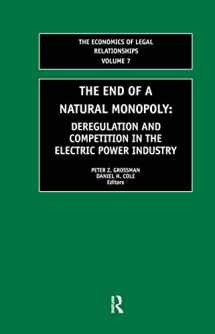
The End of a Natural Monopoly: Deregulation and Competition in the Electric Power Industry (The Economics of Legal Relationships)
Book details
Summary
Description
For a hundred years, scholars and government officials understood, or thought they did, the electric power industry. Electric power, based on a single, large service provider, connected by wires to all of its customers, was thought to be an industry that could only operate efficiently as a monopoly; indeed it was something called a "natural monopoly." Since it had to be a monopoly, with all the attendant inefficiencies and potential market abuses monopoly entails, government regulation was necessary.
These basic assumptions, which at times seemed to conflict with observed facts remained largely unquestioned for the better part of 75 years. Then, changing institutional and technological circumstances led economists to question the basis in fact of the theory of natural monopoly, and the regulatory system it entailed. Movement toward a deregulated electric power system began albeit in piece-meal fashion.
Indeed, the result has been a crazy quilt of deregulation and re-regulations, which often have resulted in more costs than benefits for society as a whole. In the most infamous case, California, the entire enterprise of regulatory change has been called into question. The process of de- or re-regulation in several other states has stopped because of fear of repeating California's mistakes.
This book addresses some of the fundamental issues underlying the debate over electric power regulation and deregulation. Only by understanding these questions and exploring a variety of possible answers to them can we hope to move the debate over the proper structure of the electric power industry. Undoubtedly, electric power deregulation will be a major legal and economic concern for years to come.


We would LOVE it if you could help us and other readers by reviewing the book
Book review



